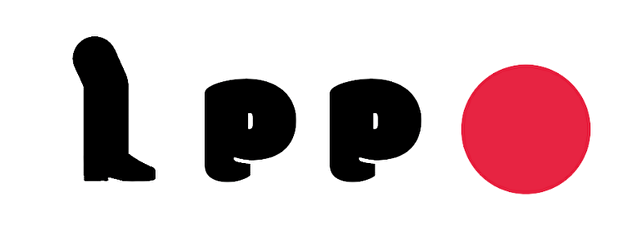We are GLOBAL ASTRA, Ltd., the start-up company and developing an ALL FREE online Japanese Learning Platform for everyone.
JLPT(Japanese Language Proficiency Test) is used to measure your current Japanese level, but do you know which level is required to be able to get a job in Japan?
There is little information about the Japanese level that the foreigners had to have when they entered the Japanese company.
There is another test called JPT, but the objective of this test is different from the other two tests and is used for more academic situations.
Since we will be talking about the topic “working in Japan”, we won’t touch any detail of the JPT. If interested in this test, visit the official site through the link.
The JPT (Japanese Proficiency Test) has been developed for Japanese learners who do not speak Japanese as their native tongue.
The JPT (Japanese Proficiency Test) is aimed at measuring and evaluating the advanced and functional communication abilities in everyday life, including business situations, objectively.
https://www.jptest.jp/en/about/
JFT-Basic vs JLPT
First of all, let’s see the difference between the main Japanese tests: JFT-Basic and JLPT.
JFT-Basic
JFT-Basic is a Japanese test especially used in Asia.
The objective is to see if the foreigners have enough ability to communicate with the Japanese in daily life.
This JFT-Basic qualification is considered important to those who come to Japan with these visa categories: 1) Technical Intern Trainee or 2) Specified Skilled Worker.
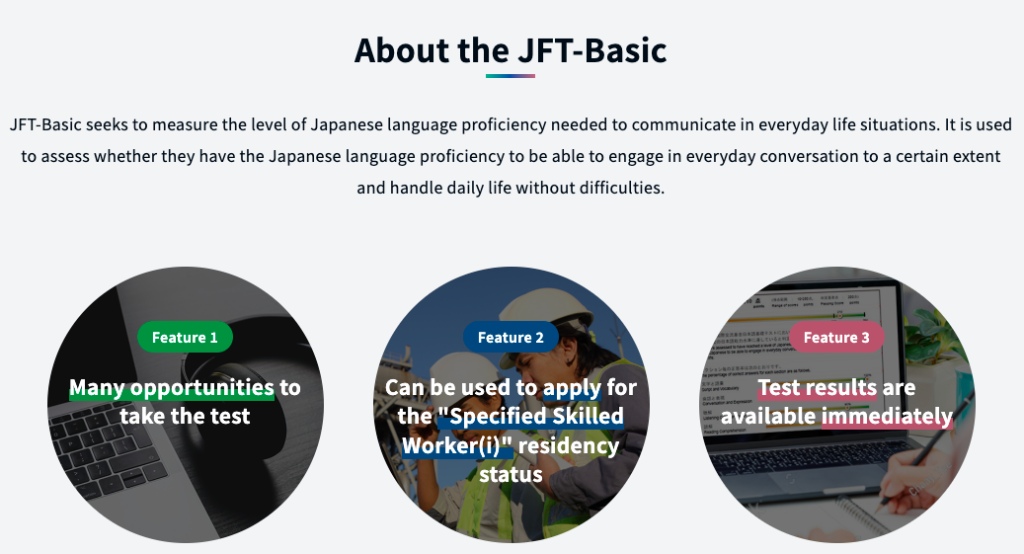
Since the JFT-Basic test is held 6 times a year, it is good for the applicants for the “Specified skilled Worker(i)” to be able to try various times.
Plus, the result will be available soon after taking the test.
However, the test is always held online, so you will have to get accustomed to using a PC. Even though you know well Japanese, you may get confused if you don’t know how to take an online test.
JLPT(Japanese Language Proficiency Test)
I assume that JLPT is well known around the world.
On the job list you can find online, the JLPT level is normally mentioned.
Unless you come to Japan with 1) Technical Intern Trainee or 2) Specified Skilled Worker visa, you will be required to have more than N3 level.
For those who want to work in a Japanese company, N2 or N1 is needed to meet their requirements. A majority of Japanese people can’t communicate in English or even if they can understand English, it is very hard for them to transmit their opinion as they want.
That is why a lot of Japanese companies ask you about the JLPT level in the phase of recruiting.
If interested, go to the official site of JLPT and check what kind of test is↓
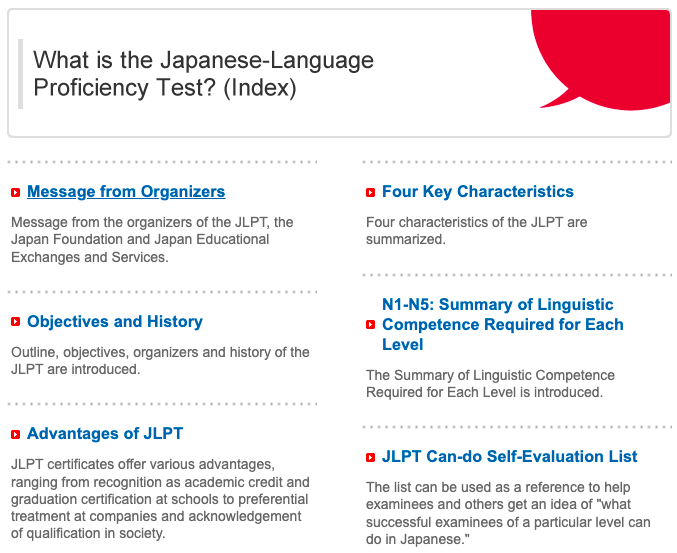
Unlike JTF-Basic, JLPT is held one or two times a year depending on your residence country. If you are in a situation where you have to pass JLPT soon, it will be complicated because you probably have to wait for 5-7 months until the next test. (If the test is held once a year, you don’t have any choice but to wait for one year…)
Summary
Here is the summary of the differences. Depending on your objective, you can take a test but if you need JLPT qualification, the preparation in advance is highly recommended.
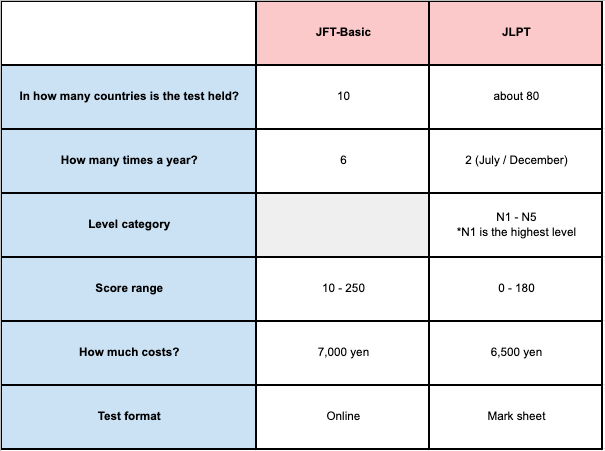
Which level is normally required?
In the case of JLPT, as you may be aware, a level more than N3 is required.
According to a job board, 15% of the Japanese companies require the N3 level, 41% require N2 and 40% require N1.
*Refer to this chart.
<Required Japanese Level>

Totally, more than 90% of the Japanese companies require more than N3 of JLPT. In Japan even though the Japanese people have a command of English, the number of people who can totally understand English is very low… For this reason, a majority of Japanese companies ask you to take at least N3 of JLPT in order that they can communicate with each other.
※Check the definition of N3 of JLPT↓
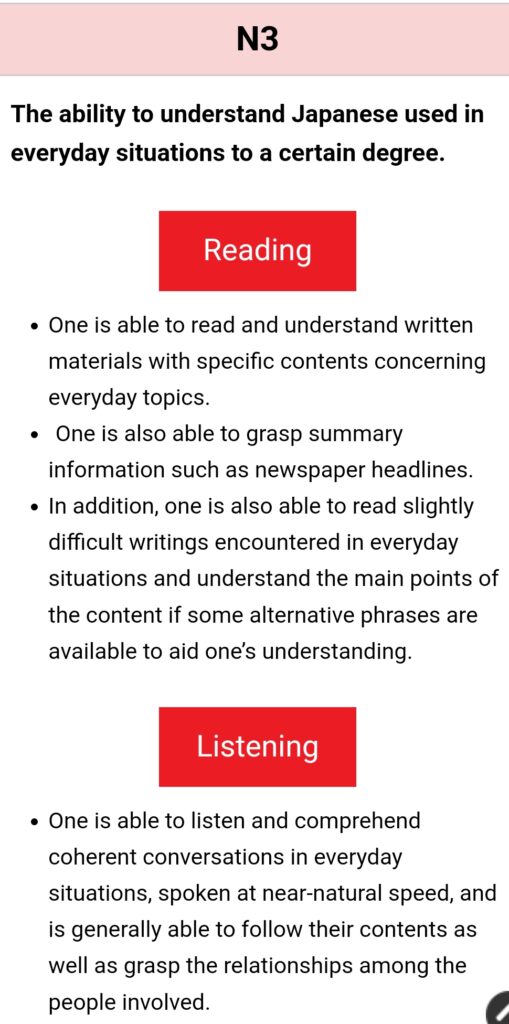
Which tests have a strong impact on CV?
As I mentioned above, JLPT and JFT-Basic are known as a measurement of Japanese levels in a working field. Among them, JLPT has a strong point.
Of course, the HR of the Japanese companies has acknowledgement that the JLPT level doesn’t correspond with the actual language level, but if you don’t have the JLPT qualification, you won’t even be considered as a candidate.
Don’t you think it is a pity? Even though you are very talented, you won’t be evaluated just because you don’t have a language qualification.
We have a strong belief that more foreigners should be able to work in Japan. So we have researched, written articles and created study support tools to help you pass the JLPT efficiently.
Where to start if you are interested in learning Japanese to work in Japan?
Daily Learning
Japanese is one of the difficult languages to master. As I know, the learners start to be surprised at the fact that Japanese has three letters: Hiragana, Katakana and Kanji. For those who haven’t had contact com a language composed of non-alphabet letters, Japanese is very challenging.
However, if you look around, a lot of people in the world mastered Japanese and are currently working in Japan. Thus, please don’t give up just because it is Japanese is hard to learn.
As a first step, we are running a Facebook page as below. Here you can easily get in touch with Japanese quizzes and answer them in the comment section. We know how difficult to keep learning every day, but if you can do it you will see the big progress in your Japanese learning!
Follow us and check our posts😉


We offer the Best Online Japanese Learning (All Free), and our goal is to facilitate the adoption into life in Japan. Our service “IPPO” is made by native Japanese teachers and professionals. The tips we share with you can help you to learn Japanese efficiently and pass JLPT (Japanese Language Proficiency Test).
